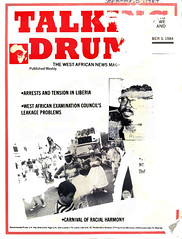African Juju And Football
From A Correspondent, Abidjan
Some of the schoolchildren, including this writer, believed the potency of the Indians not only in football but all other sporting games.
But we soon grew up to realise that it was not the Indians after all, but Africans who are guilty of over- reliance on juju in their desire to win football matches.
Various forms of juju are practised by football teams at the village, town, city and even national levels. But these have always taken the form of secret consultations with fetish priests, Mallams and Alhajis who give out medicines or conjure spirited protection, direction and guidance for the players to score more goals, concede less or no goal and come out with flying colours
Many believe that juju only gives a psychological confidence to the footballers that they would come out victorious, and therefore serves as a catalyst to wheel their general performance of the team. Others, however, hold the strong belief that juju produces the desired result. Juju, to them, is foolproof.
It is the second school of thought who participated in the 14th Antican Cup of Nations Tournament as the national teams of host country, Ivory Coast and Egypt
In their match against Cameroon, the Ivory Coast national team was led by fetish priestesses whose behaviour indicated that they were possessed by some spirits. They sprinkled some powdered substances on the playing arena and by the movement of their lips, they were no doubt releasing some incantations. They had miniature bells around their ankles, wrists, elbows and knees. They wore some dirty looking long hair.
These juju carrying women trotted to the field and enthusiastically followed by the national team of the Ivory Coast which was hosting, for the first time the African Cup of nations competition.
All these happened in the full view of the top officials of the African football Confederation. Ivorian government officials, leaders of contingents from other countries, other dignitaries and the international press. And yet they lost the match. It was baffling that the security officers allowed the women, who were not footballers, entry into the playing arena.
In the Egypt-Nigeria penalty shoot out to decide who went to the finals, the captain of the Egyptian National team opened a fat book believed to be the Holy Koran and right in the centre of the playing arena he recited some verses to the hearing of the referee, the linesmen, players, ball-boys, security officers and all others who were within hearing range.
The referee, apparently surprised at the Egyptian captain's unusual conduct ordered him to take that book from the playing arena. If the captain could not read the Koran, a substitute player on the Egyptian reserve bench could continue the verses. The captain therefore passed the fat book to another player outside the field of play. This player knelt on the touch- Bine and continued from where his captain left. And yet the Egyptians lost the match.
Can someone tell me why?
